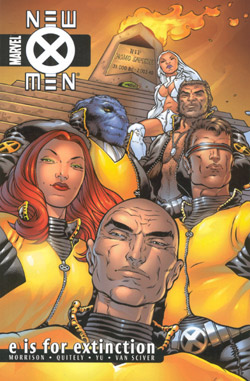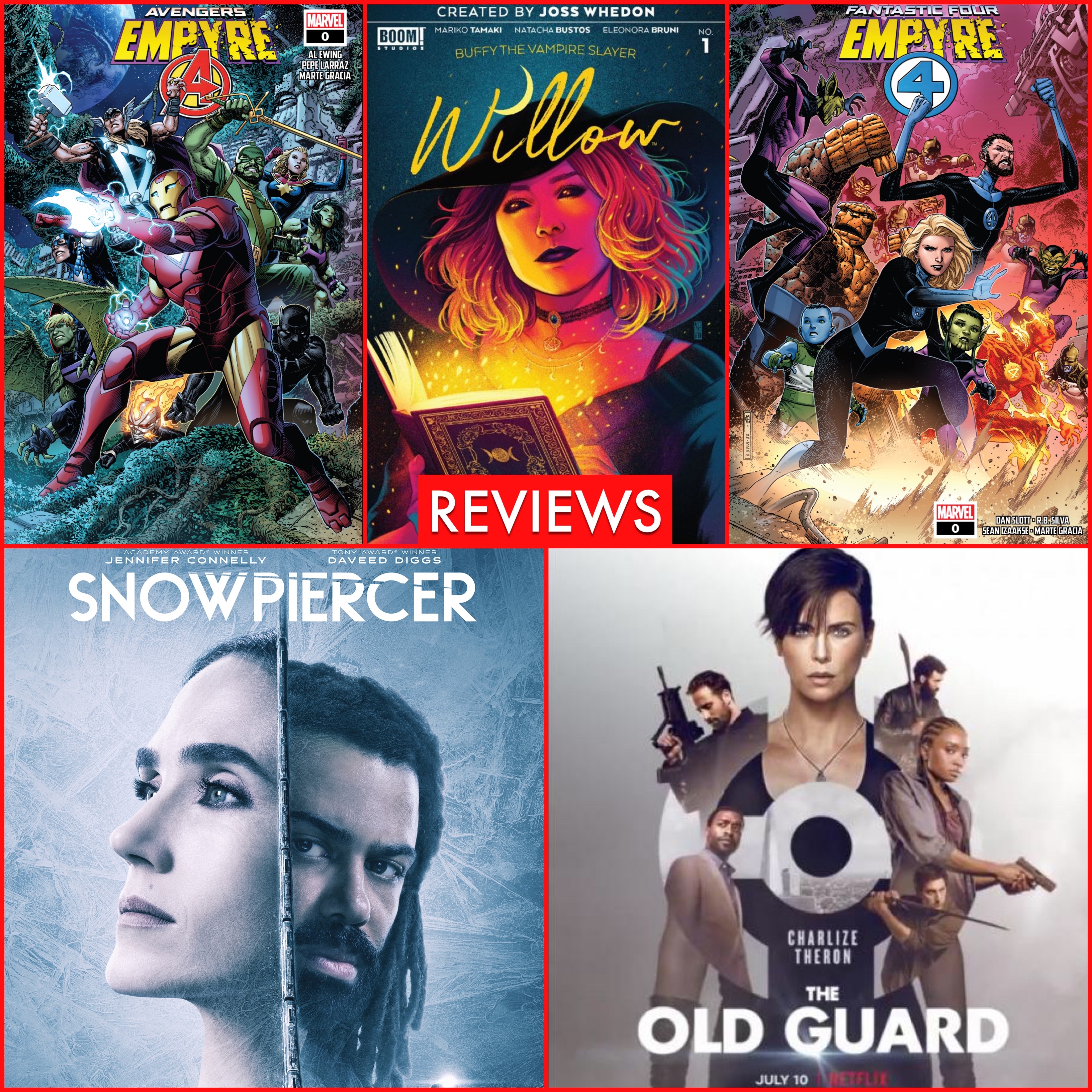|
 |
WAITING
FOR TOMMY: ETHAN VAN SCIVER
By
Richard Johnston
I first came across Ethan Van Sciver's work on Cyberfrog
years ago, when it seemed the colour indie boom was about
to do what the B&W indie boom did earlier. Cyberfrog was a
frenetic, action-packed tale of an amphibian cyborg and it
certainly made an impression on my young eyes. Since then,
Ethan has made a name for himself on superhero work, keeping
that same energy but finding more subtle ways to express it.
His recent work on New X-Men gave him prominence, as has his
devil-may-care attitude about what he says and who he says
it about on internet message boards. A natural for Waiting
For Tommy you might think. You might think right.
RICHARD
JOHNSTON: If you could take young Ethan, about to start
work on Cyberfrog, what advice would you give him? And how
much of it would you think you'd have listened to?
ETHAN VAN SCIVER: I'd have listened to anything I would
have said to myself. I always have.
I was about 19
when I started Cyberfrog. I came from a very large and very
poor Mormon family, and my mom and dad were divorcing right
at the moment I got involved with Harris Comics. We lived
in South Jersey at the time, and they both decided to live
far away from home and each other. Harris Comics literally
became my family at that point, and the excitement and awe
of getting paid to do comics was as close to a band-aid as
possible for having a fresh broken home. And the money was
better than anything I'd ever seen before. So I was absolutely
miserable and angry and happier than I'd ever been, all at
the same time. I was travelling, meeting professionals, and
having books published and read by comic book fans.
If I
could go back now, I would tell myself to stop buying up all
of those horrible toys with the money I was making. TOY BIZ
and Star Wars was not the answer to finding a lost childhood.
I wish that money had gone into the bank. Also, I would have
found a collaborator to write Cyberfrog with me. But circumstances
being what they were, I don't have too many regrets. Things
turned out okay.
RICHARD:
You're talking to a man sitting opposite a row of Clerks toys
so... what do you make to the nostalgia boom that's been erupting
through comics over the last few years? Another symptom of
the same problem?
ETHAN: I guess so. To be honest, I haven't thought
much about the nostalgia boom (which seemed more like a whimper
to me) in that light. I suppose I believe that this generation
is the first one to really want to hold on to the things of
their childhood, and not place such a high value on growing
up. Which is fine with me.
In my own case,
it was the mere fact that I was the second oldest of nine
children, and therefore, I didn't get any toys. I would get
a few Star Wars figures, C3PO over and over again, but it
hurt somehow that I didn't have what the other kids had. When
I was very small, (and this is utterly pathetic) I would take
the backs of the cards that the Star Wars figures came packed
on...remember how they used to have a big shot of all of the
individual figures that were available there? Well, I'd take
a pair of scissors and cut them out, one by one and play with
them. I think I wanted to buy toys for that kid, the kid that
had to do that.
RICHARD:
Oh that brings back memories. well you're a big boy now, and
have put aside foolish things. Or so it seems. How have you
found the internal politics of both Marvel and DC? You've
worked/are working on Impulse, Flash, Wolverine, New X-Men,
all of which have attracted attention, publisher/editor/creator
conflict and general unease in their time, while being quite
an outspoken individual. How does a creator cope at a time
when other people on the project are divided?
ETHAN: I've said before that I prefer the "internal
politics" of DC, and that's pretty much how I feel. Marvel
feels chaotic to me. Maybe that comes through in their product,
and perhaps that's part of their appeal. But I'll be absolutely
upfront here. I went to Marvel to work on New X-Men the same
way a young man joins the Marine Corps. It wasn't really something
I wanted to do, but it was clear that I needed to do it to
take that next step in life. I had conversations with the
editors I had established relationships with at DC beforehand.
They were a terrific support. Although if I had stayed at
DC following IRON HEIGHTS, I probably could have done almost
anything, I knew, and they were good enough to agree with
me, that working with Grant Morrison on X-MEN would finally
break me out. I told them I'd be back, shortly.
I had NO interest
in X-Men. It seemed like a relic out of my childhood that
I didn't care to return to. I also didn't really care to work
with Grant Morrison, since I had a longstanding rule that
I'd only work with writers that I was on equal footing with.
The writer and artist should serve each other, that's how
good comics are made. When the scales are unbalanced, things
don't feel right in the book itself. Nevertheless, on to war.
DC had given me lots of self-confidence. And so did the fans.
Within the first
few weeks at Marvel, I was dealt a devastating, ugly and underhanded
blow when I was shown the private email of Grant Morrison
to X-Men editorial regarding my work thus far on the series,
over the charade of being taken to lunch. I had been told
that the work I was doing was 'lovely, and Grant was very
impressed by it'. They didn't have the balls to tell me what
was really going on, and so they sat me in front of a computer
to read 'Grant's brilliant plans for Cyclops', which turned
out to be something completely different. I learned through
the email that no less than three other artists were chosen
by Marvel Comics to fill in on the title, without Grant's
consent. I was the fourth, and he was very unhappy.
You've got to
understand, this sort of tactic was utterly ALIEN to me. I
wasn't prepared too be lied to by my bosses like that. I wasn't
used to being kept that much in the dark about how my writer
was feeling. Usually, I correspond with them. And here I was,
three weeks into a two year exclusive contract and this sort
of sh*t was what I had to look forward to.
Frankly,
I couldn't draw anymore. I would sit at my table and just
stare at it, convinced that I had no talent, no hope, and
had been swindled away from a situation where I had been creatively
flourishing. But I had a family to support. I wrote a stammering,
apologetic email to Grant, telling him I wasn't aware of what
was going on, and I would happily quit if that would be better.
He wrote back the sweetest, most sincere letter to me expressing
sympathy for me and rage at them for invading his privacy,
and said we'd be fine working together. I never told Joe Quesada
what happened. I didn't know if he knew or not, and I figured
it'd be better if I kept it to myself.
Pages:
1 | 2
| 3 | 4
Continued Here...
|
 |







